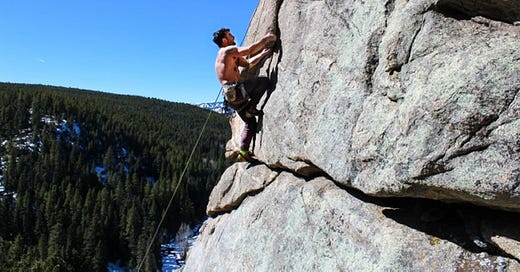He who climbs upon the highest mountain laughs at all tragedies, real or imaginable ― Friedrich Nietzsche
Here in Colorado rock climbing is all the rage. Revered for its majestic views and pristine scenery, the state attracts some of the top climbing enthusiasts from around the world. Its fear enduring rock formations offer a unique challenge for both novice and experienced climbers alike.
For many, climbing symbolizes adventure, courage, freedom, and expansion — an opportunity for one to stretch to infinite places in their inner and outer life. It is also fraught with danger, the likely reason why I’ve sadly yet to venture into it.
The story of climbing deaths brings us in touch with our mortality along with how ephemeral life can be. How a simple safety lapse could result in our tragic demise.
Risks aside, climbing activities have seen a boom in popularity over the past several years. In 2018, the Guardian highlighted its rise from a niche activity to a “worldwide sensation”, with indoor climbing centers fueling growth by as much as 20 percent each year.
Recently, I had the opportunity to chat with yogi and climbing enthusiast Rebecca Boatrite at a local Denver area coffeehouse about climbing as a metaphor for life. She and I originally met at another coffee venue where she was a barista. As a result of our random conversations, I have found myself drawn to her wisdom and insights about life.
She would be the first to admit that life has been a metaphorical climb for her. This is what led her to introduce me to the book “The Rock Warrior's Way,” a popular guide to climbing motivation, risk, assessment, focus, and fear transcendence. As described by author Arno Ilgner in the book’s introduction:
“The Rock Warrior’s Way” is both a mental-training program and a philosophy of rock climbing that draws from the rich warrior tradition and literature. Its style is very different from what many people think of as war-like, being neither combative nor overly aggressive. Rather, it is a program of balance, harmony, and insight that is inspired by a peaceable application of ancient martial traditions.”
Based on Rebecca’s recommendation, I am slowly climbing my way through The Rock Warrior’s Way, a book that forces one to confront the inherently hard, sustained, disciplined, conscious path that’s often involved when transforming our lives.
As noted in the book’s forward:
“A colossal swindle of the “New Age” movement is the notion that gaining a state of effortless being and doing requires no effort. In fact, great conscious effort, discipline, and patience are normally required to enter the “flow zone” where previously frightening challenges start taking on an aspect of relaxed ease.”
…Second, work is a process, and that process lasts a lifetime. Every time you gain a new plateau, a massif of unrealized potential soars above you. In this sense, you never “arrive,” once and for all, on the mountaintop.”
In reference to the book, I asked Rebecca about her climbing journey was progressing. Here is what she had to say:
“I’ve been climbing off and on for the past few years and have gotten really into it in recent times. Over this period I found that my biggest hurdle was always the mental aspect even though I’ve been upside down and all around in climbing my whole life.”
Recounting her early days of climbing, she admits to having an affirmation to repeat to herself at the base of the climbing wall before traversing it.
“I’d say ‘no expectations, limitless possibilities,’ which I would repeat to myself over and over again. I would hear myself and hear other people next to me say things like ‘I probably will only make it halfway up. Or, ‘maybe I shouldn’t be doing this.’ Personally, I knew that if I had this sort of mental constraint, I was only going to make it halfway up.”
Rebecca adds that when she got rid of her expectations and just allowed herself to climb, she would surprise herself more often than not. As she began climbing more and more, a friend recommended “The Rock Warrior's Way” which he described as based on the Way of the Peaceful Warrior and that tradition. Asked about what the book has meant to her, she had this to say:
“I see the book’s mindfulness training as a way to climb more efficiently, more purposefully, more joyfully, and not get stuck in the same patterns that limit our lives. Today, being on the rock climbing wall represents limitless possibilities. I’ve discovered that focusing on or drawing attention to the importance of training your mind is just as important as training your body.”
Rebecca says she had multiple people recommend “The Rock Warrior’s Way” to her over the years which begs the question “why now?” In terms of her decision to finally embrace the book, she offers this thought:
“I think when the moment comes to where we are supposed to read a book, it’s just time to read it. You just know. It’s been that way with every single book I’ve ever read. There are books on my shelves that I bought years ago that I’m just not ready to read yet. But I want to read them. And they’re there when I’m ready.”
Truth be told, hearing her perspectives got me thinking about my own proverbial climb in life, during a period when now I’m wanting to stretch more, expand more, and take more risks. So maybe you’ll see me on a climbing wall soon, tight harnesses and all.





